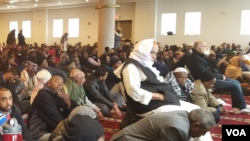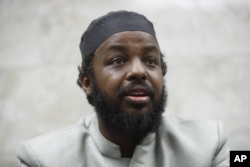Friday’s sermon at the largest Somali-run mosque in Columbus, Ohio, has focused on online extremism, radicalization and the relationship between Somali parents and their children in response to the recent Ohio State University attacks.
“We chose our Friday sermon this week to address issues that concern our community, the challenges they are facing as a result of the recent tragedy, and the root cause of that tragedy.” said Horsed Nooh, the executive director at the West Columbus Abubakar Assidiq Islamic Center.
“In my humble opinion, I believe one of the major factors that make our children and youth susceptible to extremism and radicalization is lack of communication between them and their parents," said Nooh.
Nooh said it was a message to a community that remains fearful and cautious about a possible backlash after a car and knife attack on the campus of The Ohio State University carried out by an 18-year-old student, Abdul Razak Ali Artan, who was associated with the community. Artan was killed by a police officer after 11 people were injured.
“Ninety percent of the youth are radicalized while on their beds,” Nooh told his congregation - which totals more than 2,000 people. “It's time for parents to stand up and have communication with their children."
He said the Mosque is spearheading efforts to eradicate the perception that Islam is a violent or extreme religion by offering question and answer inter-faith sessions.
“The mosque has been focusing to develop youth counseling and volunteer programs and we have already started Q and A sessions offered to the people of other faiths to come and ask us directly questions on Islam, rather than relying on the media and the misinterpretations of the extremists,” Nooh said.
Mohamed Omar Dini, who is the head of the board that runs the Mosque and the Islamic Center said the Ohio State attack left his community and the center shocked and cautious.
“The first time we got the news we said, ’O Allah don’t make the attacker Muslim and Somali. It was kind of shocking to us because this community has been living in the city for more than 25 years and there was no single attack associated with them before,” Dini said. “Our center has offered prayers to the victims in the attack and thanked the law enforcement agencies for their professional way of handling the case.”
Friday’s sermon was the first at the mosque since The Ohio State University attack last Monday. The mosque authority’s strong message to parents was to build a sort of positive communication, relationship, and trust with their kids so that they could predict the path their children are taking before they fall into the wrong hands.





